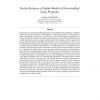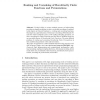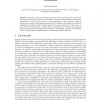63 search results - page 11 / 13 » Fuzzy Answer Set Programming with Literal Preferences |
147
click to vote
CORR
2004
Springer
15 years 1 months ago
2004
Springer
In this paper we analyze the relationship between cyclic definitions and consistency in GelfondLifschitz's answer sets semantics (initially defined as `stable model semantics...
107
Voted
CORR
2008
Springer
15 years 1 months ago
2008
Springer
Prolog's ability to return multiple answers on backtracking provides an elegant mechanism to derive reversible encodings of combinatorial objects as Natural Numbers i.e. ranki...
108
Voted
AMAI
2006
Springer
15 years 1 months ago
2006
Springer
Abstract. Recently, notions of equivalence for Answer Set Programming have been studied intensively and were shown to be beneficial for modular programming and automated optimizati...
122
click to vote
JUCS
2006
15 years 1 months ago
2006
Abstract: Multi-adjoint logic programming represents a very recent, extremely flexible attempt for introducing fuzzy logic into logic programming. In this setting, the execution of...
114
click to vote
ACL
2009
14 years 11 months ago
2009
In this paper, we analyze the impact of different automatic annotation methods on the performance of supervised approaches to the complex question answering problem (defined in th...



